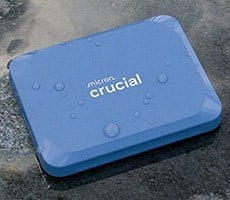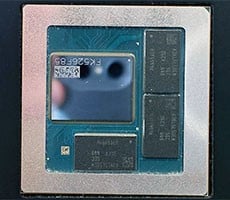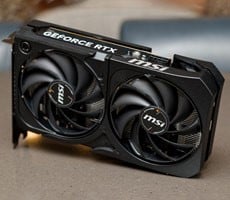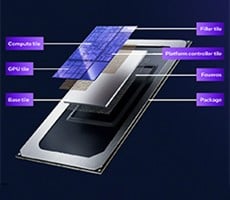EVGA e-GeForce 7800 GTX EGS
Almost immediately after we begun working with NVIDIA's reference GeForce 7800 GTX cards in the days and weeks leading up to the launch, we were contacted by a handful of NVIDIA's launch partners and informed that they'd have retail hardware ready to coincide with the official announcement of the GeForce 7800 GTX. Leadtek, Gigabyte, BFG, MSI, Asus and EVGA were among the first to contact us with some specifics regarding their respective GeForce 7800 GTX cards. The first one to send us a sample for review, however, was EVGA.
The e-GeForce 7800 GTX we'll be showcasing today is one of three 7800 based products EVGA currently has in their line-up, but we know a fourth model with a custom cooling solution should be available in the not-too-distant future as well. The e-GeForce 7800 GTX we have here, part number 256-P2-N528-AX, is essentially a duplicate of NVIDIA's reference design, with slightly different default core and memory clock speeds and a custom decal on the fan shroud. EVGA's other 7800 GTX packages, part numbers 256-P2-N538-AX and 256-P2-N525-AX, are very similar, but one ships with a copy of Battlefield 2 in addition to what we're going to spotlight for you here, and the other has a lower default core clock speed...
|
| NVIDIA CineFX 4.0 Shading Architecture •_Vertex Shaders ·_Support for Microsoft DirectX 9.0 Vertex Shader 3.0 ·_Displacement mapping ·_Geometry instancing ·_Infinite length vertex programs •_Pixel Shaders ·_Support for DirectX 9.0 Pixel Shader 3.0 ·_Full pixel branching support ·_Support for Multiple Render Targets (MRTs) ·_Infinite length pixel programs •_Next-Generation Texture Engine ·_Accelerated texture access ·_Up to 16 textures per rendering pass ·_Support for 16-bit floating point format and 32-bit floating point format ·_Support for non-power of two textures ·_Support for sRGB texture format for gamma textures ·_DirectX and S3TC texture compression •_Full 128-bit studio-quality floating point precision through the entire rendering pipeline with native hardware support for 32bpp, 64bpp, and 128bpp rendering modes API Support • Complete DirectX support, including the latest version of Microsoft DirectX 9.0 Shader Model 3.0 •_Full OpenGL support, including OpenGL 2.0 64-Bit Texture Filtering and Blending •_Full floating point support throughout entire pipeline •_Floating point filtering improves the quality of images in motion •_Floating point texturing drives new levels of clarity and image detail •_Floating point frame buffer blending gives detail to special effects like motion blur and explosions NVIDIA Intellisample 4.0 Technology •_Advanced 16x anisotropic filtering (with up to 128 Taps) •_Blistering- fast antialiasing and compression performance •_Gamma-adjusted rotated-grid antialiasing removes jagged edges for incredible image quality •_Transparent multisampling and transparent supersampling modes boost antialiasing quality to new levels •_Support for normal map compression •_Support for advanced lossless compression algorithms for color, texture, and z-data at even higher resolutions and frame rates •_Fast z-clear NVIDIA UltraShadow II Technology •_Designed to enhance the performance of shadow-intensive games |
NVIDIA Digital Vibrance Control (DVC) 3.0 Technology •_DVC color controls •_DVC image sharpening controls NVIDIA SLI Technology •_Patented hardware and software technology allows two GPUs to run in parallel to scale performance •_Scales performance on over 60 top PC games and applications NVIDIA PureVideo Technology •_Adaptable programmable video processor •_High-definition MPEG-2 and WMV9 hardware acceleration •_Spatial-temporal de-interlacing •_Inverse 2:2 and 3:2 pull-down (Inverse Telecine) •_4-tap horizontal, 5-tap vertical scaling •_Overlay color temperature correction •_Microsoft Video Mixing Renderer (VMR) supports multiple video windows with full video quality and features in each window •_Integrated HDTV output Composited Desktop Hardware Engine •_Video post-processing •_Real-time desktop compositing •_Accelerated antialiased text rendering •_Pixel shader-driven special effects and animation Advanced Display Functionality •_Dual integrated 400MHz RAMDACs for display resolutions up to and including 2048x1536 at 85Hz •_Dual DVO ports for interfacing to external TMDS transmitters and external TV encoders •_Full NVIDIA nView multi-display technology capability Advanced Engineering •_Designed for PCI Express x16 •_Designed for high-speed GDDR3 memory Operating Systems •_Windows XP/Windows XP 64 •_Windows ME •_Windows 2000 •_Linux •_Macintosh OS X |
EVGA included a nice assortment of software and accessories in the bundle for their e-GeForce 7800 GTX. Along with the card itself, EVGA included a small folder that contained a basic user's guide, a couple of EVGA stickers, a driver / utility CD with trial versions of SnapStream's Beyond Media and Ulead's DVD Movie Factory 3, and EVGA's ResChanger 2005 tool, and another disc with a copy of Cyberlink's PowerDirector software. EVGA also included a pair of DVI-to-DB15 adapters, a dual-molex-to-PCIe power adapter, an S-Video cable, and a small breakout box that housed S-Video and composite inputs, and component and S-Video outputs. The breakout box and PowerDirector software compliment the e-GeForce 7800 GTX card's ViVo (Video-In / Video-Out) capabilities.
EVGA's bundle was decent, but we would have liked to have seen a couple of other items included as well. Noticeably absent in the e-GeForce 7800 GTX's bundle was any type of game or full-version DVD playback software. Although, the trial version of Beyond Media can playback DVDs and the 256-P2-N538-AX model is available for only a few dollars more, that includes a copy of the excellent Battlefield 2.












